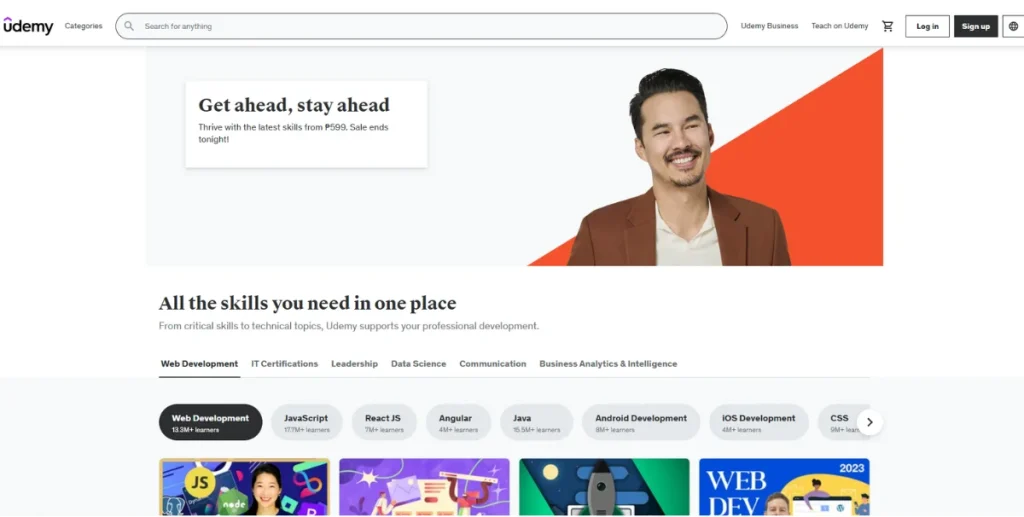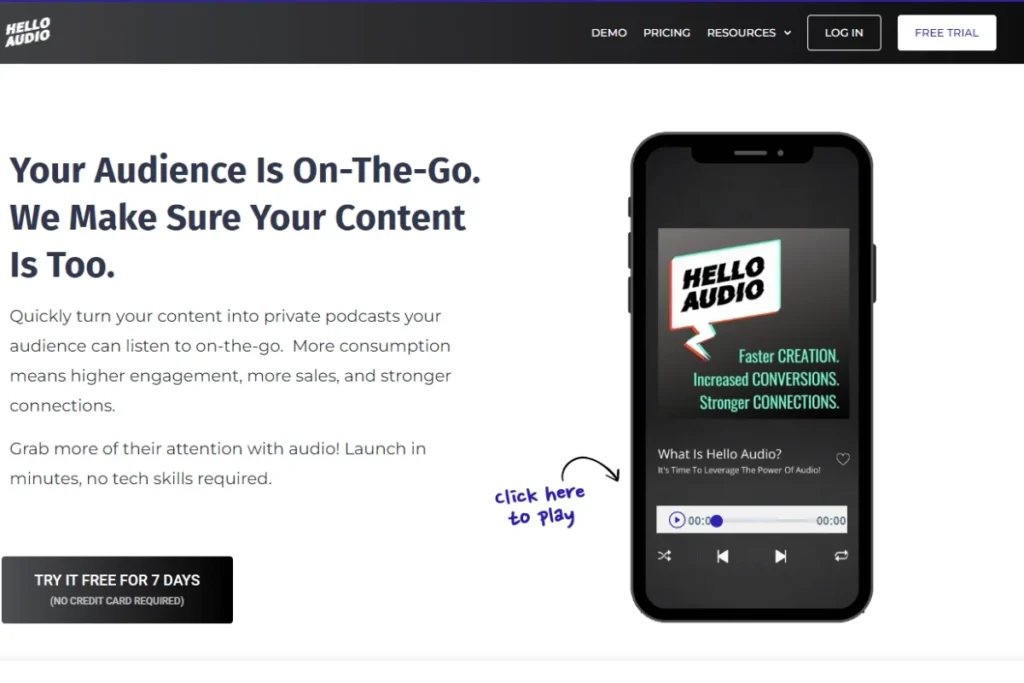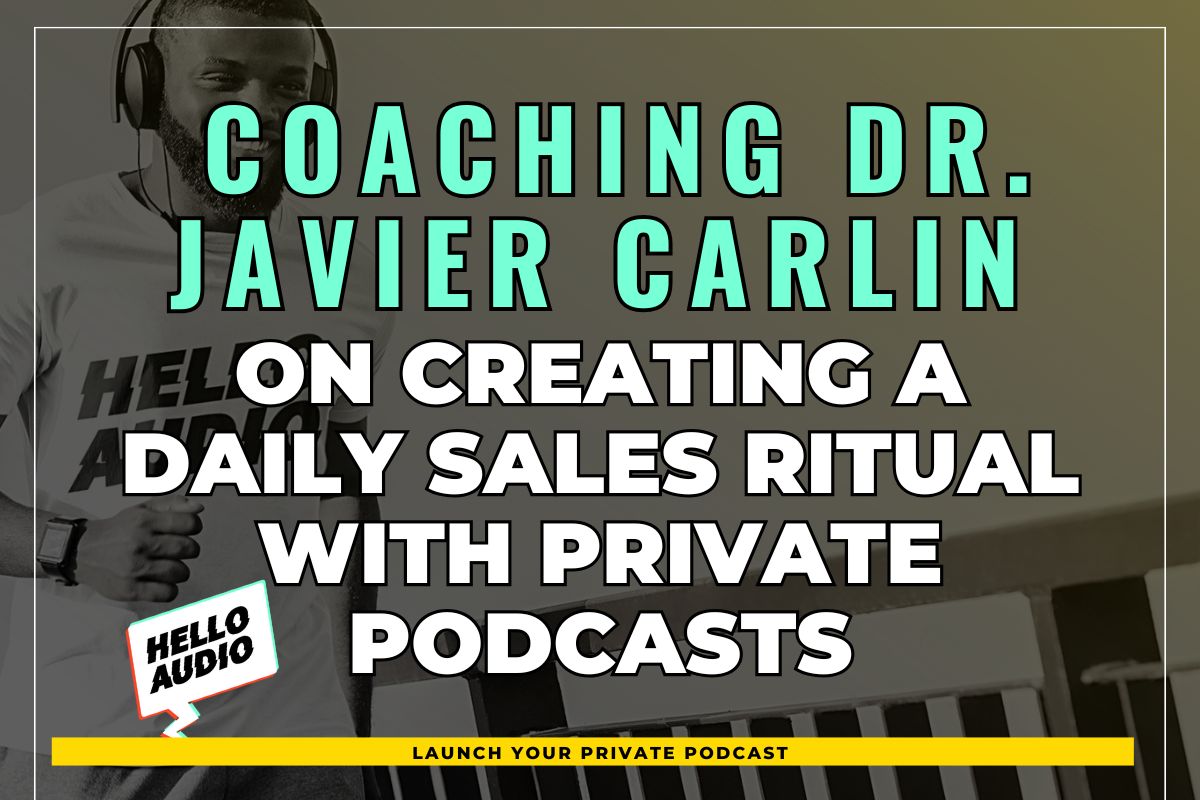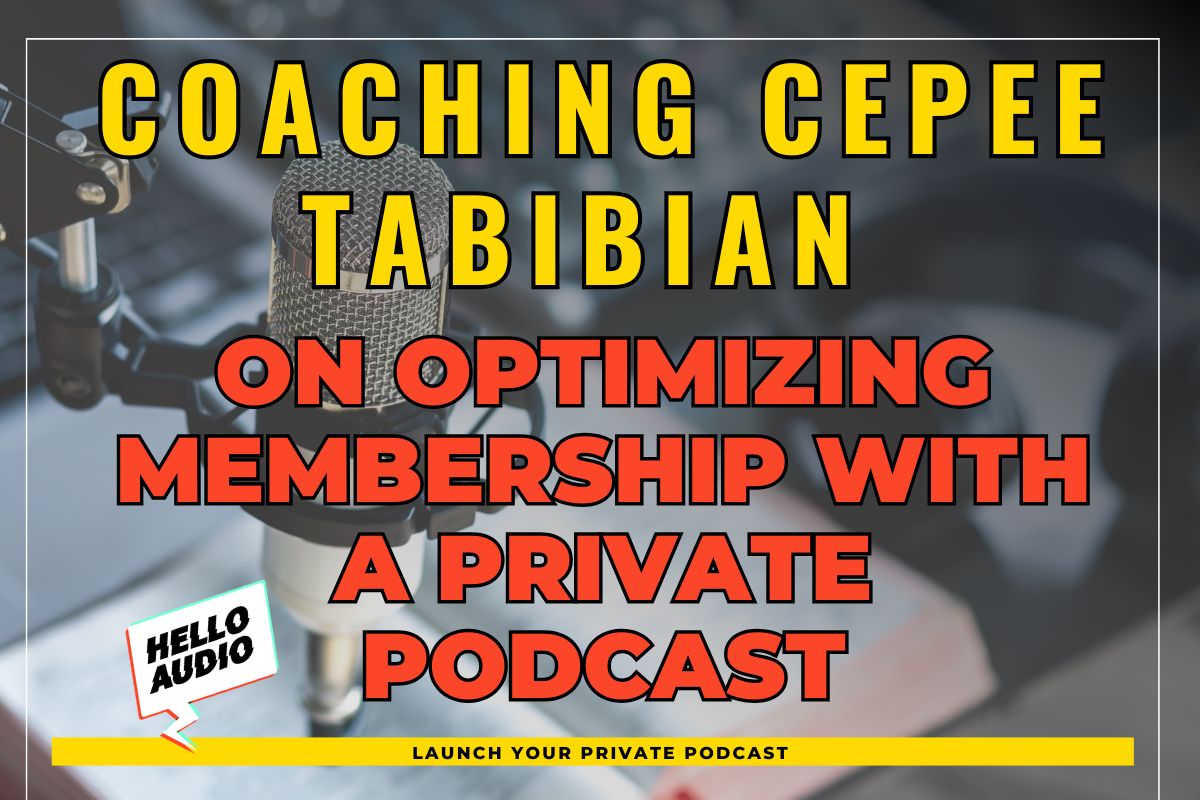Choosing the right e-learning platform can significantly impact whether your content thrives or struggles.
With 24% of online students concerned about the lack of quality and support, it’s important to choose a platform that meets their needs.
While Udemy is a go-to for many instructors, it might not be the best fit for everyone.
In this article, we’ll discuss some Udemy alternatives that can help you connect meaningfully with your audience, widen your reach, increase revenue opportunities, and build a dedicated community.
TL;DR – Best Udemy Alternatives
Short on time? We’ve ranked the top Udemy alternatives you can consider:
- Hello Audio
- Teachable
- Coursera
- LinkedIn Learning
- Thinkific
- edX
- Udacity
- Pluralsight
- Skillshare
- MasterClass
- Khan Academy
We’ll discuss these options in detail below.
In the meantime, if you’re ready to maximize your learner engagement and boost sales, sign up with Hello Audio to start repurposing existing content with private podcasts.
Repurposing your content lets you reach a wider audience, increase engagement through a different content format, and add value to existing material — all without starting from scratch.

What is Udemy?
Udemy is an online learning platform that offers an expansive library of courses across various subjects, including technology, business, art, and more.
The platform was launched in 2010 and has become a popular choice for experienced educators, industry experts, and more.
How Does Udemy Work?
Udemy serves as a marketplace for instructors to upload courses that typically include video lectures, quizzes, and supplementary materials.
Creating a course on Udemy is simple. You create a topic and define your audience.
From there, Udemy guides you in setting clear course objectives and structuring course content through lectures, activities, and assignments. Once created, you can publish, market, and price your course.
How Much Does Udemy Cost?
Creators do not have to pay a fee to create or host a course on Udemy, whether the course is free or paid. Instead, Udemy operates on a revenue-sharing model.
Udemy’s revenue share for instructors includes 97% of sales made through instructor promotions, while creators only receive 37% of the revenue from marketplace sales.

Major Cons of Udemy
While Udemy offers several benefits, a few downsides to using the platform exist. Here are some of them:
- Quality variation: Anyone can create their own course, so the quality can be inconsistent.
- Limited customization: Udemy controls the platform’s branding, so creators cannot freely customize the look, feel, and brand of the course experience.
- Intense competition: With over 250,000 courses, Udemy’s marketplace is highly competitive. It can be challenging to stand out if you lack the marketing resources or do not have an established audience.

Our 11 Favorite Platforms Like Udemy
We’ve carefully selected and rounded up the best Udemy alternatives for course creators looking for more features, flexibility, or support.
Below are our top picks:
1. Hello Audio

Hello Audio is all about audio content delivery. Our platform makes it easier for creators to reap the benefits of repurposing content by converting audio and videos into engaging private podcasts.
Your audience can conveniently listen to these podcasts on their own time, thereby increasing engagement and sales. You also get to build a stronger community by producing private podcasts.
Unlike Udemy’s course-centric model, Hello Audio allows you to distribute your content across popular podcast platforms like Apple Podcasts and Google Podcasts, ensuring you capture a larger slice of the pie.
Looking to turn your course content into private podcasts with Hello Audio? Now’s your chance to sign up and get started!
2. Teachable vs. Udemy
Teachable is a popular choice for instructors seeking more control over their branding and sales processes. It allows you to create personalized websites for hosting and selling courses directly to your audience.
Instructors also earn 100% of their sales minus the transaction fees – a straightforward method of compensation. Meanwhile, on Udemy, you can only earn a significant portion (97%) by selling through referral links, while marketplace sales yield just 37%.
Tip: If Teachable is also not a good option for you, you can consider other Teachable alternatives that offer better control.
3. Udemy vs. Coursera
Though Udemy and Coursera are both large platforms, they differ in terms of their features. Coursera usually employs top academics from established universities, while any expert can teach Udemy courses.
This makes Coursera a good choice for professionals with advanced qualifications or those who want to offer courses with high academic credibility.
Think of Coursera as a low-cost alternative to on-campus programs. They offer certificates, specializations, and sometimes degrees for learners seeking an alternative to formal education.

4. Udemy vs. LinkedIn Learning
LinkedIn Learning offers significant advantages to course creators, particularly due to its high standards for instructor acceptance and the collaborative approach to course development.
Because LinkedIn is a platform for professional networking, course creators can only produce career-oriented educational content.
Meanwhile, Udemy is a course marketplace that is more accessible to instructors. Depending on the content you aim to produce, both platforms are advantageous in their own right.
5. Thinkific vs. Udemy
Thinkific and Udemy offer distinct approaches to course creation and delivery. Thinkific provides course-building features designed to enhance the student learning experience — something lacking in Udemy.
With features like an AI course outline generator and quiz generator, Thinkific enables creators to develop in-depth, engaging courses.
Thinkific, an online community platform, also excels with its powerful marketing features, such as AI-driven email campaigns and automation — all made possible by the 90+ integrations in the Thinkific App Store.
6. Udemy vs. edX
edX stands out as a Udemy alternative thanks to its academic partnership with top institutions. This makes edX a considerable platform to use if you want to deliver academically rigorous content.
Note that you can only create content if you work at an institution partnered with edX.
For qualified creators, choosing edX provides a prestigious and structured environment to reach students seeking high-quality academic courses.
Academic institutions or businesses can consider using Open edX, an open-source platform for building online courses. However, this is not the same as edX, as Open edX provides more flexibility for organizations to manage their learning environments independently.
7. Udacity vs. Udemy
While Udemy focuses on a wide range of course topics, Udacity can be your platform of choice if you’re an expert in specialized fields like artificial intelligence, data science, and programming.
The platform’s Nanodegree programs are designed in collaboration with top companies like Google and IBM, which makes your courses appealing to learners seeking job-ready skills.
Hence, Udacity might be a better option for creating in-depth, technical content. Prices in Udacity are higher than those in Udemy as they offer a more comprehensive learning experience.

8. Pluralsight vs. Udemy
One of the biggest differences between Pluralsight and Udemy is their revenue model. With Udemy, course creators get a portion of each sale, while in Pluralsight, creators’ earnings are based on learning engagement and completion time.
Pluralsight specializes in tech and software development.
As a creator, you can create a structured curriculum to help students retain what they learn.
9. Skillshare vs. Udemy
Skillshare focuses more on the creative industry, making it well-suited for creatives to teach skills like illustration, photography, and writing.
Skillshare also encourages community-based learning, which promotes collaboration among your students.
The platform offers a unique project-based format that encourages students to engage more actively with content, allowing for a higher level of interaction than traditional modes of learning.
However, unlike Udemy, Skillshare does not allow you to set a price for your courses, so you may want to look at other Skillshare alternatives.
10. MasterClass vs. Udemy
MasterClass is a learning platform exclusive to prominent figures and experts in various fields. Unlike Udemy, which allows anyone to create courses, MasterClass selects its instructors based on their reputation and expertise — only reaching out directly to invite them.
While this exclusivity can build credibility, it limits the potential for diverse course offerings. But, with the high production values, your audience will enjoy a more premium learning experience compared to Udemy.
11. Udemy vs. Khan Academy
Khan Academy is another recognized name in the e-learning industry. However, it is geared more towards K-12 learners and focuses on academic subjects such as math, science, and the humanities.
Note that Khan Academy operates on a non-profit model, meaning creators do not get to monetize their content directly.
The platform is committed to offering free education globally.
Hence, the content on Khan Academy is usually developed by educational experts or volunteers to provide free access to high-quality educational materials.

How to Choose the Best Option for Your Needs
There are many alternatives, so how do you pick the best one? Take note of the following before you decide:
- Identify your goals: Define your purpose for creating courses and understand your target audience’s preferences and technical skills.
- Check available marketing tools: Assess marketing capabilities, including email automation and integration of SEO tools.
- Evaluate customer support: Check for available customer support options and learning resources, such as tutorials and learning communities.
- Compare cost: Compare pricing models, including subscription options and transaction fees, and take advantage of free trials.
Best Udemy Alternative for Instructors
That being said, one Udemy alternative for instructors stands out — Hello Audio. These are the reasons why:
- Content Repurposing: You can easily repurpose current content with private podcasts, a more engaging medium that maximizes your content’s reach and value.
- Focus on Audio Content Delivery: Our platform is designed for creators who want to monetize content and prefer audio-first strategies that appeal to on-the-go learners.
- Community Building: Private podcasts help enable a closer connection with your community.
- User-Friendly Platform: There’s no need to be a tech whiz to get started with Hello Audio; our platform is made to be intuitive.
Looking for a more engaging and monetizable way to share your courses? With Hello Audio, you can repurpose your content with private podcasts, build a tight-knit community, and create a steady stream of income with audio content delivery.
Sign up for a free trial with Hello Audio to engage your audience and monetize your content with private podcasts!

Frequently Asked Questions (FAQs)
Below, we’ll answer the most frequently asked questions we’ve received on Udemy alternatives:
Which Alternatives to Udemy Provide Better Support for Course Creators?
Hello Audio is an alternative that provides excellent customer support.
For example, Hello Audio provides reliable email support and a comprehensive Hello Audio Knowledge Base with resources and support documentation.
Are there Udemy Alternatives that Allow for More Control Over Course Pricing?
Among the alternatives, Hello Audio allows for more flexibility over course pricing.
You can create membership tiers with varying prices that your audience can purchase to gain access to your exclusive content.
Which Websites Similar to Udemy Have Stronger Community Engagement?
Hello Audio has stronger community engagement than Udemy as it emphasizes community-based learning.
Through private podcasts, you can engage with your communities more intimately.
Conclusion
Udemy may be a big player in the e-learning space, but it’s worth noting that there are various alternatives that suit different teaching styles, course topics, and learner needs.
Your platform of choice ultimately depends on your goals as a creator and how you want to engage your audience.
If you’re looking to build stronger connections with your audience, offer exclusive content, and monetize your expertise, Hello Audio is the perfect solution.
Want to convert your course content into private podcasts with Hello Audio? Sign up for a free trial to start increasing course engagement!












